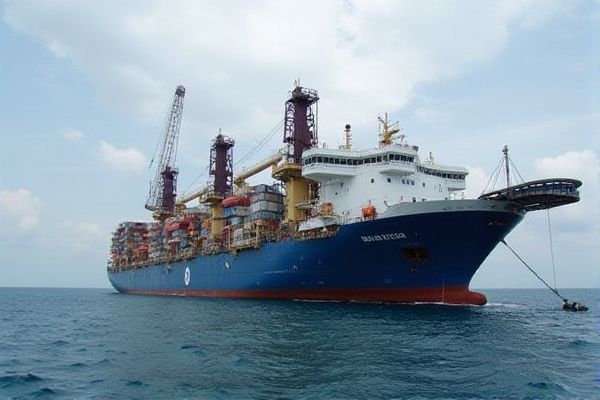
The Philippines has a thriving maritime sector offering numerous job opportunities across various sea-based industries. Roles are available in shipping, fishing, offshore oil and gas, and tourism, catering to a diverse range of skills and qualifications. Maritime education and training institutions provide programs that prepare candidates for positions such as ship crew members, marine engineers, and maritime logistics specialists. With the country's strategic location and extensive coastline, professionals in these fields can benefit from a robust job market and potential for career growth.
Job Description
Sea-based jobs in the Philippines offer a wide range of opportunities within the maritime industry, catering to various skills and expertise. Positions can include roles such as marine engineers, deck officers, and crew members on commercial vessels ranging from cargo ships to fishing boats. These jobs often provide competitive salaries, allowances, and the chance to travel, making them appealing to many Filipinos seeking employment. Engaging in these careers can lead to valuable experiences and professional growth in the vibrant maritime sector of the Philippines.
Requirement
Sea-based jobs in the Philippines often require specific qualifications, such as a Bachelor's degree in marine engineering or a related field. Certification from recognized maritime training organizations, including STCW (Standards of Training, Certification, and Watchkeeping for Seafarers), is essential for compliance with international safety standards. You may also need to undergo a medical examination to ensure you meet the health requirements for working at sea. Fluency in English and knowledge of navigational software can further enhance your employability in this competitive job market.
Salary and Perks Expected
Sea base jobs in the Philippines offer competitive salaries that can vary depending on the role and level of experience. Entry-level positions may start around PHP 20,000 to PHP 30,000 monthly, while specialized roles like engineers or supervisors can earn upwards of PHP 60,000. Common perks often include allowances for meals and travel, health insurance, and sometimes even educational support for you and your family. Companies in this sector also typically provide opportunities for career advancement, enabling you to enhance your skills and increase your earning potential over time.
Similar Job Names
- Marine Biologist
- Marine Engineer
- Subsea Technician
- Offshore Operations Supervisor
- Naval Architect
- Fisherman
- Deck Officer
- Marine Safety Officer
- Port Manager
- Hydrographic Surveyor
- Oceanographer
- Shipbuilding Technician
- Marine Surveyor
- Tugboat Captain
- Fishery Technician
- Marine Policy Analyst
- Underwater Welder
- Aquaculture Manager
- Maritime Logistics Coordinator
- Sea Freight Specialist
Job Expectation Concept
Sea-based jobs in the Philippines present unique opportunities within the maritime industry, catering to a range of roles such as sailors, engineers, and maritime officers. Employment in this sector often requires specific skills and certifications, ensuring that workers are well-prepared for the demanding conditions at sea. The potential for career advancement, competitive salaries, and benefits significantly attracts Filipinos to these positions. Understanding the expectations and requirements of sea-based jobs can help you make informed decisions in pursuing a rewarding career in this vibrant industry.
Career Advantage and Weakness
Sea-based jobs in the Philippines offer numerous career advantages, including competitive salaries and opportunities for travel. Employees gain valuable experience and skills that are recognized internationally, enhancing their employability on a global scale. However, these jobs often come with challenges such as long periods away from home, which can affect family life and personal relationships. You might also face demanding work conditions at sea, requiring physical and mental resilience to succeed in this dynamic field.
Important Thing Must Know
Sea base jobs in the Philippines offer numerous opportunities in various sectors, including shipping, fishing, and maritime tourism. These positions often require specific certifications and training, such as proficiency in safety protocols and marine operations. Comparing to land-based jobs, sea base roles frequently provide competitive salaries and the chance to work in a dynamic environment that encourages teamwork. The Philippines, being an archipelago, has a strong maritime culture, making these jobs integral to the economy and community development. Understanding the requirements and potential career paths can help you make informed decisions about pursuing a sea base career.
Alternative Career Options
The Philippines offers various alternative career options for those considering sea-based jobs. You can explore opportunities in marine research, conservation, or tourism, where your skills can contribute to environmental protection and sustainable practices. The shipping industry also requires professionals in logistics, supply chain management, and maritime law, providing a range of roles away from traditional seafaring positions. Pursuing certifications in these fields can enhance your employability and open doors to rewarding careers on land.
Companies List
- Philippine Ports Authority (PPA)
- International Container Terminal Services, Inc. (ICTSI)
- Aboitiz InfraCapital
- Magsaysay Maritime Corporation
- Marine Industry Authority
- Subic Bay Metropolitan Authority (SBMA)
- Transnational Diversified Group
- Philippine Coast Guard
- ST Engineering
- GAC Shipping Philippines
List of Ideal City
The Philippines offers several cities ideal for sea-based jobs, making it a prime location for maritime career opportunities. Manila, the capital, boasts a bustling port and numerous shipping companies, providing a hub for maritime employment. Cebu, known for its vibrant economy and strategic location, also presents various job prospects in shipbuilding and marine transport sectors. Davao, with its growing infrastructure and access to international shipping routes, increasingly attracts maritime professionals seeking rewarding careers.
 jobs-philippines.com
jobs-philippines.com